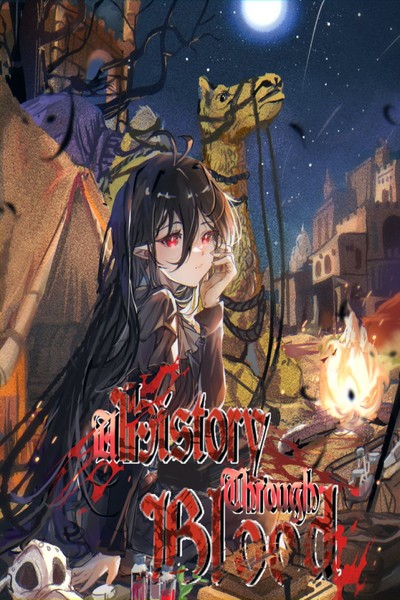From the dawn of human civilisation, caravans have always been harbingers of both mystery and wonder. They are the bearers of foreign spices, lush fabrics and other luxury goods from lands far distant. Vibrant cultures and knowledge from remote realms will often find themselves spread throughout the various far-flung settlements which lie far from their often-humble origins. These boons containing knowledge and wealth are not the only travelers which find themselves joining the wandering merchants. Fetid diseases, ruminations of prejudice and unseen dangers are likewise carried unto unsuspecting towns, often unknown to the unfortunate merchants who unwittingly transport them.
English Countryside – England, 1480s
The relatively sudden emergence of mankind was but a fleeting forethought for the English Countryside which had seen countless species crawl into existence over the eons, only to fade out once more. The sole mark of humanity’s existence on the untamed wildlands was that of a well-trod earthen path that wound throughout the landscape. Clusters of long grass lining this crude divide in nature, constantly threatened to reclaim the land that had been repurposed in the pursuit of man’s supposed progress.
A lone figure wandered through the cold autumn, night adhering to the well-worn path as he progressed toward to his unknown destination. The presence of the solitary wanderer drove the local inhabitants of the road darting for whatever cover they could find in the dense and thriving weeds. A brown travelling cloak covered his choice in travelling attire: a selection of leather padding that covered his otherwise simple clothing. The man’s worn visage bore the rugged appearance that was far too common for those embroiled in a life of violence. Whilst one might mistake William’s ragged appearance for that of a mercenary or other variety of hired muscle, his garments were engraved with the symbols and writing derived from his holy scripture.
The wanderer’s attention was drawn to the enchanting lights that originated from some isolated outpost of civilisation that stood atop of some unremarkable grass-covered hill. From his position on the earthen path, he could identify the outlines of an assortment of wagons that, in all likelihood, belonged to the caravan of traders that he was pursuing. Presumably the merchants were waiting for the break of dawn before continuing their travel towards whatever town, collective or commune that they proceeded to. His legs drew him closer to the outcrop of humanity before him, the man’s ears were slowly filled with the sounds of soulful music and idle chatter as he closed the distance with the caravan.
The man in question was William, an archaic hunter from an often-hidden church order. William was drawn to this caravan under instruction by the high priest. Officials in the church had caught onto queer reports of vampires hiding within one of the many caravans that travelled through the countryside. The reports had been received from the numerous churches that dotted the northern border between England and Scotland. They were peculiarly vague, confusing, and often contradictory. Ordinarily they would have been dismissed as rumor or speculation without any action being taken. The most common thread among the reports was that at least one vampire, whose sex varied depending on the report, was operating within the confines of the caravan. Some accounts disputed this, claiming tales of hags, daemons or other such dark creatures which were considered outlier in the reports. However, the reviewing body concluded that the being was simply misidentified as the vampire seemed to carry with a wide variety of bizarre potions or other peculiar alms, of which they applied to the townsfolk for payment.
-
Vampires are night-dwelling creatures whose core identity is strongly tied to the dark magical element. Most of mankind’s knowledge of these nocturnal creatures is derived from the accounts of terrified survivors in congruence with various tales from ancient folk law. There are several annals that recount with meticulous detail the aftermath of humanity's attempts at extermination of individual vampires. Due to the manner in which they feed, that is, by consuming blood, they usually are societal outcasts and often are forced to abduct their meals, leading to predictably gruesome and bloody results. Contrary to common conception, blood itself is not the primary food source, which in fact is the energy taken from the soul that then circulates through the body using the blood as a bio-conduit.
Their ties to the black magical element manifest in numerous manners; for instance, their souls are generators of potentially immense spiritual power, that can reinforce their body and increase their physical prowess. This comes at the cost of increased vulnerability to light-based magic that weakens the soul’s bond with its host which in turn can render the vampire immobile. This extends to sunlight which takes a constant toll on their body, affecting even the more powerful vampires who can lose consciousness due to prolonged exposure.
This power and control over their soul does not apply only to their own soul. Their bite naturally severs the soul of their prey upon prolonged contact. The vampire’s bite will replace the victim’s soul with a minute portion of their magic, binding it to their own soul. The body is then under the full control of the vampire, turning the now soulless body into nothing more than a puppet made of flesh. These soulless creatures are commonly referred to as thralls and are often likened to zombies, though there are minor differences in intelligence and biological complexity between the two. Vampires can also invite other souls into their own and then physically manifest those souls at will. Records have labeled these creations as Familiars, though these are extremely rare as many vampires are unaware of how to form the pact.
-
Under different circumstances William would travel with an assortment of highly trained warriors and clerics to safely deal with whatever threat they were made aware of, however given the dubious credibility of the information received, it was not deemed worthy of any serious attention. Much of the senior clergy had dismissed the overly imaginative tales as a mere wiccan which did not warrant much attention when more pressing issues were at stake across the sea. The reports did not include any hallmarks of a pervasive threat, such as the brutal murders or disappearances that were typical of the horrendous creatures. A more paranoid voice among the councils decided to err on the side of caution and send an experienced hunter alone to survey the situation and confirm whether the reports were the result of cumulative speculation of the commonfolk.
Arriving at the aforementioned caravan, William surveyed the cluster of wagons and their inhabitants as it spanned before him. By his hasty estimates there were about forty-five people standing around various fireplaces, drinking and chatting among themselves. Many of the women in the camp were making adjustments and repairs to piles of damaged clothing. The men swapped stories while performing maintenance on the assortment of wagons, harnesses and other contraptions necessary to operate their trade. Solitary figures fanned out on the extremities of the camp, standing watch in constant vigilance against the multitude of opportunistic aggressors that dwell outside the bounds of civilised society. The guards were, in all likelihood, recruited from some of the more successful mercenary bands. They quickly identified the lone transgressor, reforming their organisation to confront the strange arrival that slowly approached the caravan.
Several members of the caravan guard quickly formed a blockade of flesh and steel, forcing William to meet them on the dark threshold which lay between the wild fields and their small bastion of humanity. The guards, armed with an array of weapons, did not actively threaten William with violence; rather, their body language indicated that they were ready to act on any sign of violence. One of the smaller of watchmen spoke first, stating with whatever authority he held: “State your business!” William slowly raised his empty hands, in a gesture of good faith. “My name is William. The church has tasked me with observing some of the caravans passing through the region.” The migrating caravans were no stranger to the gaze of the powerful forces that claimed dominion over whatever path they travelled. The Church was no exception. An informal network of all castes had been established to inform the merchants of the particulars of the locals they passed through. Customs, laws, religious views, regulations, dangerous individuals, and other such insights were used to traverse the social constraints and desires of the dominant culture of each region.
The guards exchanged apprehensive looks, in a rapid wordless debate. Ultimately, they decided to let the stranger pass as the implications of defying one of the larger regional influencers would not be in the convoy’s best interest. “You may enter. However, cause trouble and you will be thrown out. Speak with Edward before you do anything, he should be in his wagon back there.” The guard’s hostile hand gesture pointed toward the centre of the conglomeration. William nodded in understanding before entering the camp.











![[Volume 1] Chapter 1.1 - The search for hidden evil](https://us-a.tapas.io/sa/c1/89f0d7db-209b-4daa-829f-4d6da62a965a.jpg)
Comments (1)
See all